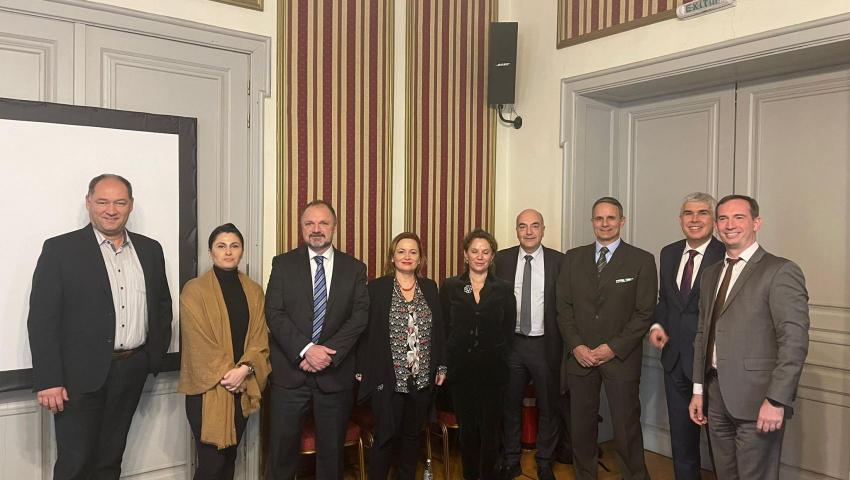New projects along the Vertical Gas Corridor are reversing the direction of gas

A number of gas connectivity projects are expected to be unveiled by mid-2024 along the route of the Vertical Gas Corridor. It is about securing additional quantities of natural gas for the region with new sources of supply. This was announced by the executive director of Bulgartransgaz, Vladimir Malinov, within the framework of the meeting of the gas transmission operators along the route - Greece, including DESFA, ICGB, Gastrade, which will manage the LNG terminal in Alexandroupolis, the operators of Romania, Hungary, Slovakia, as well as the visiting operators of the initiative gas transmission systems in Moldova and Ukraine.
In particular, it is about the so-called "reverse gas direction" with an entry point from Greece and to double both the entry and exit capacity of gas flows to reach the region.
At this stage, the required amount of investment was not mentioned, with the promise that it will be disclosed early next year, when all the results of the non-binding phase of each of the planned projects are expected to be clear.
The sources of additional quantities will be three - from existing and future liquefied natural gas (LNG) terminals in Greece, from the Caspian region - Azeri or others, as well as by reversing the TAP gas pipeline from Italy to Greece and from there to the region. In the first place remains the LNG terminal in Alexandroupolis, which should enter into operation between February 15 and March 1, and the first quantities will reach all customers with reserved capacity.
"We are ready within the middle of next year to enter the binding phase with projects along the entire route of the Vertical Gas Corridor. Accordingly, if the market participants confirm their intentions, we will be ready to conclude binding contracts for the transmission of natural gas and start the investments," said Vladimir Malinov. According to him, all operators have a common understanding regarding the significance of the projects and the need for adequacy in terms of market demand.
"What we have set ourselves as a common goal is to react as adequately, as quickly as possible and in the most financially efficient way possible to the need of the market and the changed directions of natural gas, namely from liquefied natural gas (LNG), which could to come from the terminals in Greece and to provide our services to transport it for the whole region", explained the executive director of Bulgartransgaz.
He reminded that precisely in order to respond more quickly to the market need, the gas transmission network operators are already in a fairly advanced phase. He reminded that within the framework of this year, all operators jointly conducted a market test. "We have identified what the need is in the market. We are currently identifying and determining the specific network expansion projects that will be needed and the investments we will need to make in order to bring them to market early next year," he said. According to him, then it will be clear what the investments will be. The projects will then be submitted to national regulators for approval.
The plans are on January 16th for these projects to be publicly announced – “such as the size of each project, line infrastructure, amount of investment in compressor stations and accordingly with the indicative capital expenditure that each of the operators has to make. Upon successful completion of the binding phase, which we are talking about in June next year (2024), we believe that at the community level, within 2 to 3 years, these projects can be put into operation," Malinov also stated. Within the framework of the meeting in Athens, which will be attended by the European Commissioner for Energy, Kadri Simson, it is planned to consider the possibility of whether these contracts will be implemented in a commercial way, which means by concluding long-term capacity reservation contracts or including with other financial mechanisms by which these projects can be supported to enable diversification in the first place of sources of supply and not least the security of supply," explained the executive director of the gas operator.
He specified that Ukraine and Moldova are currently not part of the initiative, but are showing interest. "We believe that the Ukrainian market after the end of the war that is currently being fought in Ukraine, the country that is one of the largest markets will also have the greatest need for diversification," Malinov said. As is known, before the war the country's dependence on Russian gas was almost 100%.
The executive director of Bulgartransgaz explained that even now there is capacity on the Trans-Balkan gas pipeline, but there is already talk of additional capacity that the market is looking for over the existing one.
"Including within this year, quantities that were delivered through Greece, including passing through the ICGB and then through the Bulgartransgaz system were delivered to the Moldovan market. Energocom, the state gas and electricity supplier, is an active user of the systems. So from this point of view and at the present moment we have a technical possibility for the Trans-Balkan gas pipeline in a reversible model to operate and supply gas, including to the Ukrainian and Moldovan markets," said Vladimir Malinov.
Meanwhile, ENTSOG announced the start of the project collection process for the Ten Year Network Development Plan 2024 (TYNDP 2024). Project promoters are required to submit their projects during the "Project Submission Phase" between 23 November and 22 December 2023.
Project promoters who have already submitted their projects for TYNDP 2022 must resubmit their projects and provide updated data for their projects to be considered for TYNDP 2024, the release said.
